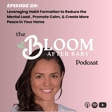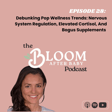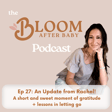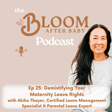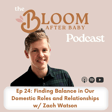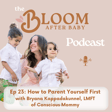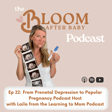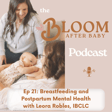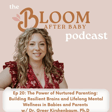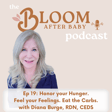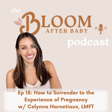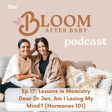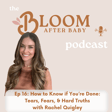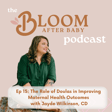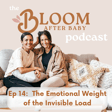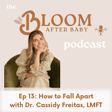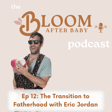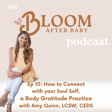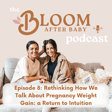
11. Hey Dads: What I Wish I Knew, with Sean Daggett
In this week's episode, Rachel invites you into an intimate conversation she has with her husband and father of two, Sean Daggett. He shares a bit about what he learned from entering fatherhood; specifically what he wishes he had known in order to be better prepared for the vulnerable period of postpartum.
This is a good one to share with a new or expecting dad!
HUGE gratitude to ALL the men out there who are being change-makers and cycle breakers!!
Links and resources mentioned in the episode:
Postpartum Mental Health Help for Dads
Our Free Guide to Addressing Resentment in Your Relationship After Baby
Why We Can't Ignore Dad's Mental Health
You can learn more about Rachel's California-based group therapy practice and how you can work with her at www.racheldaggettlmft.com or on instagram @rachelscouch
If you enjoyed this episode and appreciate what we share here, we would be so honored if you shared the show and tagged us, @bloomafterbaby on Instagram so that we can see it and connect with our listeners!
We’d also be so grateful if you would rate and review our podcast in your favorite podcast app, because that’s the best way for a new podcast to get more people to listen so we can keep growing!
*Please note that this podcast is intended for educational purposes only, and is not a substitute for seeking individualized care from a mental health or medical professional*
Stay Tuned for more to come from Rachel Daggett and Dr Jen Jordan on all things motherhood and mental health - real mom experiences and insights from a licensed psychotherapist and medical doctor.
Learn more about us and access all of our courses, services, and free resources at bloomafterbaby.com
Pregnancy tips Postpartum wellness Prenatal care New motherhood Postpartum recovery Maternal health Pregnancy journey Expectant mothers Postpartum support Motherhood experience Parenting advice Family dynamics Parenting tips Raising children Family well-being Parenting challenges Family relationships Parenting insights Mental health for mothers Emotional well-being Health at Every Size Coping with motherhood Maternal mental health Self-care for moms Stress management Emotional resilience Conversations with experts Interviews with mothers Real-life parenting stories Expert advice for moms Support for new mothers Insights on motherhood Informative parenting discussions Working moms Empowering mothers Couples therapy Psychotherapy Breastfeeding tips Sleep during pregnancy Postpartum nutrition Marriage and Family Marriage after baby Balancing work and motherhood Pregnancy self-care Healthy pregnancy habits Relationships Intuitive Eating Mindfulness Body Acceptance
